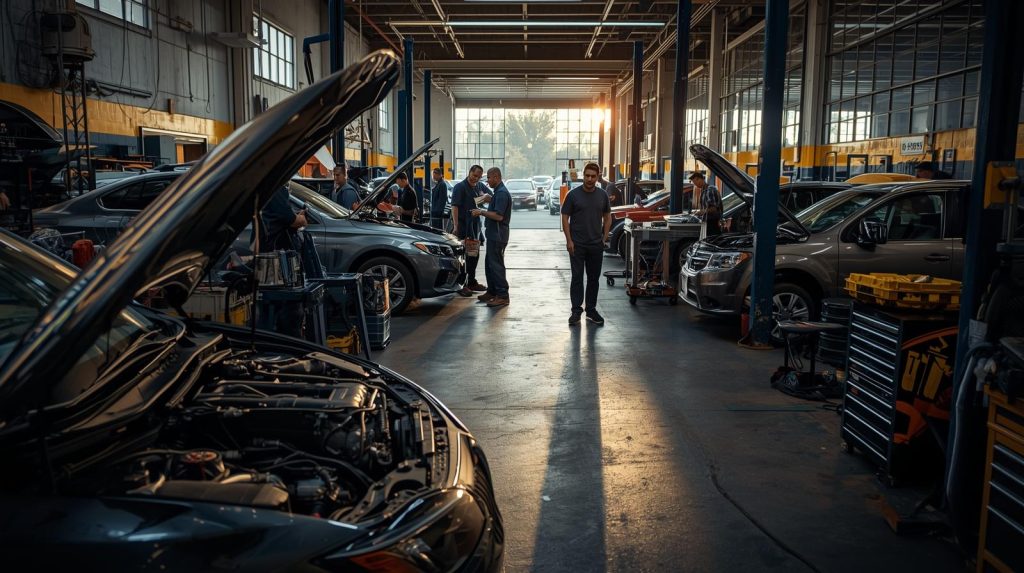Permits Required to Open a Mechanic Shop in the US: A Comprehensive Guide

Opening an auto repair or mechanic shop in the United States involves navigating a mix of federal, state, and local regulations. While there are no overarching federal licenses specifically for mechanic shops, businesses must comply with national laws on taxes, environmental protection, worker safety, and labor standards. Most operational permits and licenses are handled at the state and local levels, where requirements vary significantly. For instance, some states mandate shop registrations or technician certifications, while others focus on environmental compliance and zoning.
This guide draws from authoritative sources like the IRS, EPA, OSHA, and state departments such as DMVs and environmental agencies. Always verify with local authorities, as regulations can change—last updated based on information as of October 21, 2025. Key search terms like “permits to open mechanic shop US” (around 1,200 monthly searches) and “state auto repair regulations” highlight the need for tailored advice.
Contents:
Federal Requirements for Mechanic Shops
At the federal level, the focus is on business identification, environmental compliance, worker safety, and fair labor practices. These apply nationwide and are enforced by agencies like the IRS, EPA, OSHA, and DOL.
- Employer Identification Number (EIN): Required from the IRS for tax purposes if you have employees, form an LLC/corporation, or operate as a partnership. It’s free and obtained online via the IRS website.
- EPA Regulations:
- Hazardous Waste Identification Number: If your shop generates hazardous waste (e.g., used oil, batteries, solvents), register with the EPA for proper disposal under RCRA (Resource Conservation and Recovery Act).
- Motor Vehicle Air Conditioning (MVAC) Certification: Mandatory under Section 609 of the Clean Air Act if handling refrigerants; technicians must be certified, and shops need approved recovery equipment.
- National Emissions Standards for Hazardous Air Pollutants (NESHAP): Applies to shops involved in painting or surface coating; requires notification to the EPA if using certain materials.
- OSHA Safety Standards: Under the Occupational Safety and Health Act, shops must follow rules for hazard communication (e.g., SDS for chemicals), personal protective equipment (PPE), respiratory protection, and machine guarding. Common for auto shops: Ensure ventilation for fumes, proper lifting equipment, and fire safety.
- Department of Labor (DOL) Compliance: Adhere to the Fair Labor Standards Act (FLSA) for minimum wage, overtime, and child labor. If employing workers, provide workers’ compensation (often state-mandated but with federal oversight).
- FTC Consumer Protection: While not a permit, comply with rules on fair advertising and repair estimates to avoid deceptive practices.
Right-to-Repair laws (e.g., REPAIR Act and SAFE Repair Act) focus on access to diagnostic tools and data but don’t directly require permits for opening a shop.
General State and Local Requirements
States regulate mechanic shops through DMVs, environmental departments, and business licensing offices. Common across most states:
- Business License/Registration: A general or specialized license to operate; often requires proof of insurance, zoning compliance, and fees.
- Zoning and Land Use Permits: Ensure the location is zoned for commercial/auto repair; may need building permits for renovations.
- Sales Tax Permit: Required if selling parts or services; register with the state revenue department.
- Environmental Permits: State-specific for air quality, waste disposal, and stormwater (e.g., spray booth permits).
- Workers’ Compensation Insurance: Mandatory in most states if you have employees.
- Technician Certifications: Varies; ASE (Automotive Service Excellence) is recommended nationally but required in some states for specific work like emissions.
Local variations: Cities/counties may add fire safety, signage, or occupancy permits.
State-Specific Variations
Requirements differ by state, with some like California and New York having strict registrations, while others (e.g., Texas, Florida) emphasize business and environmental compliance. Below is a table summarizing key examples based on state laws. For a full list of mechanic licensing by state, many (e.g., Alabama, Florida) don’t require individual licenses but mandate shop registrations.
| State | Key Permits/Licenses | Notable Requirements |
|---|---|---|
| California | Automotive Repair Dealer (ARD) from Bureau of Automotive Repair (BAR); Seller’s permit; Hazardous waste permit; Air quality/spray booth permit. | $200 annual fee; EIN, business license; Smog Check/STAR station if applicable; Onsite inspections. |
| New York | Motor Vehicle Repair Shop Registration from DMV. | $10 app fee + $150/2 years; Zoning/fire/building compliance letter; Air conditioning equipment certification if applicable; No individual mechanic license. |
| Massachusetts | Motor Vehicle Repair Shop License; Surety bond ($10,000). | $450 fee; Workers’ comp; Occupancy/flammable storage permits; EPA NESHAP notification; Air permit for spray booths. |
| Arizona | Air Quality Individual Permit (if boiler/generator); Hazardous Waste EPA ID; Used Oil Collection Registration. | Drywell registration; Waste tire site; No individual mechanic license required. |
| Texas | Business registration; Sales tax permit; Environmental compliance via TCEQ (e.g., waste disposal). | Local permits (e.g., Houston Auto Dealers Detail); No state mechanic license; Focus on emissions in certain areas. |
| Florida | Motor Vehicle Repair Registration from FDACS. | Annual renewal; No individual mechanic license; Local registrations (e.g., Miami-Dade). |
| Hawaii | Motor Vehicle Repair Dealer License; Individual mechanic license from Board. | ASE certification + experience; Business license. |
| Michigan | Mechanic Certification from Secretary of State. | Tests in categories; Trainee permits; No shop-specific license mentioned. |
For other states, consult resources like NEXT Insurance’s guide or state DMVs—e.g., most don’t require individual licenses but emphasize shop compliance.
FAQs: Opening a Mechanic Shop
How much do permits cost?
Varies: $100–$1,000 for state licenses; environmental permits may add more. Expect $5,000–$10,000 total startup compliance costs.
Do all states require a mechanic license?
No—only a few like Hawaii and Michigan for individuals; most require shop registrations.
What if I handle emissions or painting?
Additional certifications (e.g., ASE L1) and permits (e.g., air quality) are often needed.
Consult a local attorney or SBA office for your area. For personalized advice, start with your state’s DMV or environmental agency.